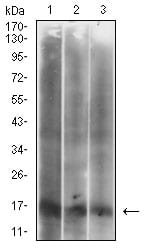
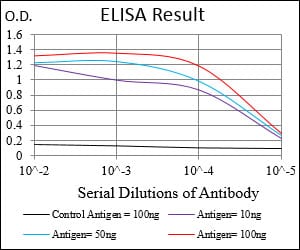
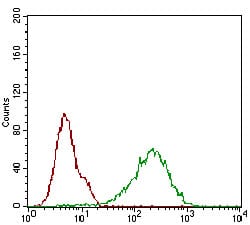
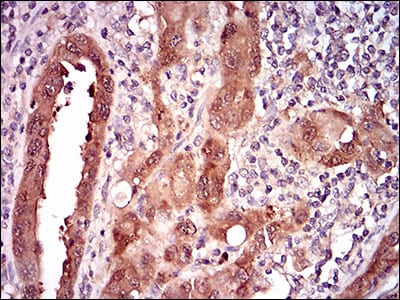
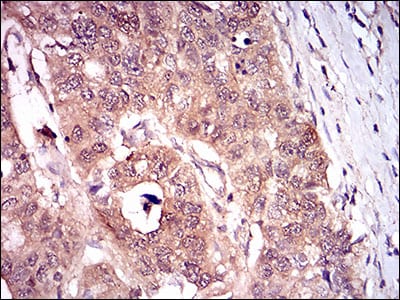
| WB | 1/500 - 1/2000 | Human,Mouse,Rat |
| IF | 咨询技术 | Human,Mouse,Rat |
| IHC | 1/200 - 1/1000 | Human,Mouse,Rat |
| ICC | 技术咨询 | Human,Mouse,Rat |
| FCM | 1/200 - 1/400 | Human,Mouse,Rat |
| Elisa | 1/10000 | Human,Mouse,Rat |
| Aliases | ARF; MLM; P14; P16; P19; CMM2; INK4; MTS1; TP16; CDK4I; CDKN2; INK4A; MTS-1; P14ARF; P19ARF; P16INK4; P16INK4A; P16-INK4A |
| Entrez GeneID | 1029 |
| clone | 1D7D2A1 |
| WB Predicted band size | 16.5kDa |
| Host/Isotype | Mouse IgG1 |
| Antibody Type | Primary antibody |
| Storage | Store at 4°C short term. Aliquot and store at -20°C long term. Avoid freeze/thaw cycles. |
| Species Reactivity | Human |
| Immunogen | Purified recombinant fragment of human CDKN2A (AA: 1-156) expressed in E. Coli. |
| Formulation | Purified antibody in PBS with 0.05% sodium azide. |
+ +
以下是关于CDKN2A抗体的3篇参考文献示例:
---
1. **文献名称**: *"p16INK4a Immunohistochemistry in Cervical Biopsy Specimens: A Systematic Review and Meta-analysis"*
**作者**: Klaes R. et al.
**摘要**: 该研究系统评估了p16INK4a(由CDKN2A编码)抗体在宫颈活检标本中的诊断价值,表明其过表达与高危HPV感染及宫颈上皮内瘤变(CIN)显著相关,可作为宫颈癌早期筛查的辅助标志物。
---
2. **文献名称**: *"CDKN2A/p16 Loss Implicates Immune Evasion in Human Cancers"*
**作者**: Akbani R. et al.
**摘要**: 通过多癌种组织芯片分析CDKN2A/p16抗体的表达,发现p16蛋白缺失与肿瘤微环境中免疫细胞浸润减少相关,提示CDKN2A失活可能通过免疫逃逸机制促进癌症进展。
---
3. **文献名称**: *"Validation of Anti-p16 Antibodies for the Detection of CDKN2A Alterations in Melanoma"*
**作者**: Curry J.L. et al.
**摘要**: 研究验证了多种商业抗p16抗体在黑色素瘤中的特异性,发现部分抗体在免疫组化中可有效区分CDKN2A基因缺失或甲基化导致的蛋白表达缺失,为分子分型提供可靠工具。
---
4. **文献名称**: *"Prognostic Significance of p16 Protein Expression in Pancreatic Adenocarcinoma"*
**作者**: Hecht J.R. et al.
**摘要**: 利用CDKN2A抗体检测胰腺癌组织中的p16表达,发现p16阴性患者总生存期显著缩短,提示p16可作为胰腺癌预后不良的生物标志物。
---
以上文献聚焦于CDKN2A抗体在诊断、机制探索及预后评估中的应用,涵盖宫颈癌、黑色素瘤、胰腺癌等多种肿瘤类型。
The CDKN2A gene, located on chromosome 9p21. encodes two critical tumor suppressor proteins, p16INK4a and p14ARF (p19Arf in mice), through alternative reading frames. These proteins regulate cell cycle progression and apoptosis via distinct pathways. p16INK4a inhibits cyclin-dependent kinases (CDK4/6), preventing Rb phosphorylation and G1/S transition, while p14ARF stabilizes p53 by binding MDM2. promoting cell cycle arrest or apoptosis. CDKN2A inactivation—via mutations, deletions, or promoter hypermethylation—is frequently observed in cancers, including melanoma, pancreatic, and lung cancers.
CDKN2A antibodies are essential tools for detecting protein expression in research and diagnostics. They help assess CDKN2A loss in tumors, correlate it with prognosis, and study mechanisms of oncogenesis. p16INK4a antibodies are widely used as biomarkers in cervical cancer (linked to HPV) and as senescence markers. However, antibody specificity is challenging due to shared exons between p16INK4a and p14ARF, requiring careful validation. Common applications include immunohistochemistry (IHC), Western blotting (WB), and immunofluorescence (IF).
In clinical settings, CDKN2A antibody-based assays aid in molecular subtyping and therapeutic decision-making. For example, p16 overexpression in oropharyngeal cancers may indicate HPV association. However, variable staining patterns and tissue-specific expression necessitate standardized protocols. Overall, CDKN2A antibodies remain pivotal in understanding cell cycle dysregulation and advancing cancer diagnostics.
×